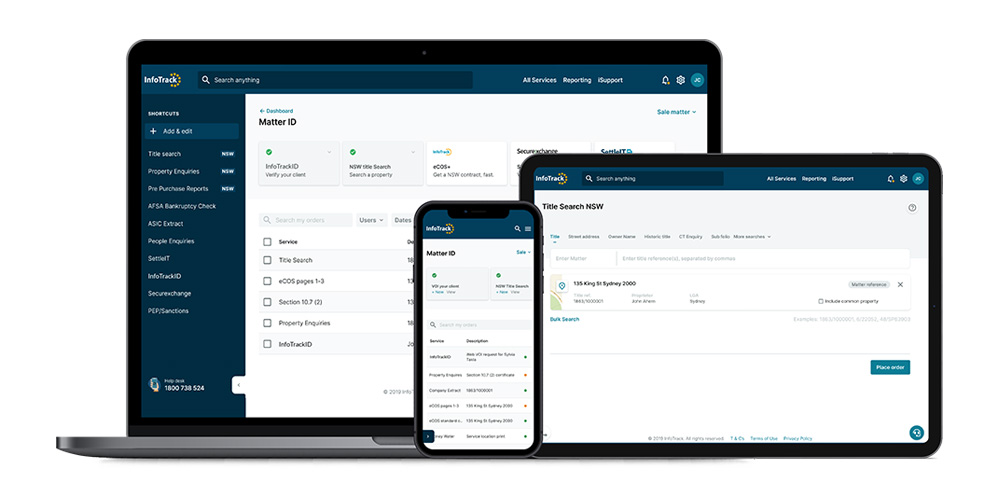Legal work is about more than just testimony and case law. It’s also about information. For example, a law firm might need to know who owned a particular piece of property at a particular time, when they bought or sold it, and whether there’s ever been a lien against it. InfoTrack puts the data legal professionals need at their fingertips. In addition to its property search service, the company sells software integrations for more than 30 legal practice management systems, enabling users to find information when and where they need it without switching between and searching multiple systems.
Just as InfoTrack acts as a bridge between different resources at law firms, GitHub acts as a bridge between different technology teams at InfoTrack. “It’s more than just source code control,” says CTO Sebastian Mill. “It’s the language we speak.”
GitHub provides a common platform for all developer-related tasks and processes at InfoTrack, including communication, documentation, and learning initiatives. It’s a boon for onboarding because it means everything a new hire needs to get started is in one place. “With email, things tend to get lost, especially since we hire so many people,” Mill says.

Besides, most new hires are already familiar with GitHub. “Developers love it,” Mill says. “They already use it for their own projects.” Mill says that listening to developers and letting them use the tools they prefer is a big part of InfoTrack’s strategy. “Giving developers the right tools doesn’t just help them do better work,” he says. “It also helps us retain talent. A lot of businesses like to make decisions from the top-down, but it’s important to listen to developers.”
Mill says that since InfoTrack started using GitHub in 2016, the company is now able to bring new features to market at least 2x times faster while the number of defects in their code have dropped dramatically. The key, he says, is that GitHub makes it possible to iterate much faster.
For one thing, GitHub makes it easy to find and leverage other people’s code. Instead of starting from scratch, InfoTrack’s developers can leverage existing work for the foundation of a new project and iterate from there. In many cases that means building on, and contributing to, open source projects. But InfoTrack’s developers also use GitHub to find projects and components built by their colleagues in other parts of the company. Innersource and code reuse have long been a priority for InfoTrack. The company’s developers spread across Australia, the UK, and the US frequently contribute bug fixes and new features to repos initially created by other teams. “We’re quite mature in terms of code reuse and collaboration,” Mill says. “The US and Australian teams don’t necessarily talk on Slack every day, but they communicate frequently through pull requests.”

The availability of both open source and internal repositories is also great for learning new technologies. “It’s valuable for developers to have tangible examples when they are learning something new,” Mill explains.
Updating and maintaining old code is easier as well. For example, if a developer wants to switch from using one front-end JavaScript framework to another, they can easily search through GitHub repos and find all the files that need to be updated to support the new framework. “I think we take it for granted these days, but in the old days it would take forever to hunt down the hundreds or thousands of source code files that might need to be updated because something changed in some other part of the code,” Mill says.
More efficient learning and less time searching for old files means more time being productive and, ultimately, faster times to market.
GitHub does more than just help InfoTrack’s developers work faster. It helps them write better code—and gets more people involved in the development process. InfoTrack takes an “API first” approach to development, both internally and, increasingly, externally. “Big customers like banks expect APIs,” Mill says. “So more APIs are in our future.” Teams start writing API documentation during the earliest stages of development. While only programmers can really contribute to the process of evaluating code, anyone can read the docs. That opens the doors to more feedback on the API early in the process. All of the documentation is on GitHub in its own repo and presented with GitHub Pages. Team members, including non-programmers, can file issues or pull requests on the documentation, allowing them to collaborate on APIs and other software as it’s built. The approach results in better documentation and better tests, which ultimately results in fewer defects.

Security is extremely important in the legal industry, so InfoTrack naturally takes advantage of GitHub’s vulnerability scanning tools. Security scans are part of InfoTrack’s CI/CD pipeline, which makes it possible to catch issues before code is even committed, let alone deployed.
“We want to reduce the number of potential mistakes that people can make,” Mill says. “GitHub Advanced Security is the tool that lets us do just that. Unlike the other products we’ve evaluated, Dependabot not only flags potential security issues, but helps us take action by generating pull requests to actually fix them. That enables us to patch things much more quickly and be more productive overall.”
Unlike the other products we’ve evaluated, Dependabot not only flags potential security issues, but helps us take action by generating pull requests to actually fix them. That enables us to patch things much more quickly and be more productive overall.
Dependabot is increasingly important, Mill says, as the company comes to rely more on third party open source components for front-end JavaScript development.
InfoTrack is only beginning its journey with GitHub Actions, but Mill sees lots of potential in the product to streamline DevOps procedures. “In my opinion, developers have to learn too many different tools,” he says. “The more tools we can replace with Actions, the easier it is to onboard people.” InfoTrack is working to automate more of its deployment process using Actions, which will mean fewer tools for individual developers to need to learn to be productive.

“We want to make our developers’ lives easier by enabling them to spend more time building features and less on managing build or deploy tools,” Mill says. “That increases both productivity and developer happiness.”
InfoTrack is also working on using Actions to help keep documentation up-to-date automatically. “The idea is to compile documentation automatically based on the changes developers make,” Mill explains. “Then those updates will be published automatically to GitHub Pages.” Another benefit to this workflow is that it will keep documentation close to the code, so developers don’t have to search for documentation in other systems and possibly request additional permissions to access documentation.
From onboarding to documentation to collaboration to security, there are few parts of the InfoTrack development process that don’t rely on GitHub. “It’s impossible for me to fathom how we’d operate without GitHub,” Mill says. “I think we’d be lost without it.”




